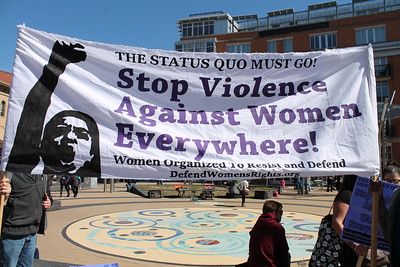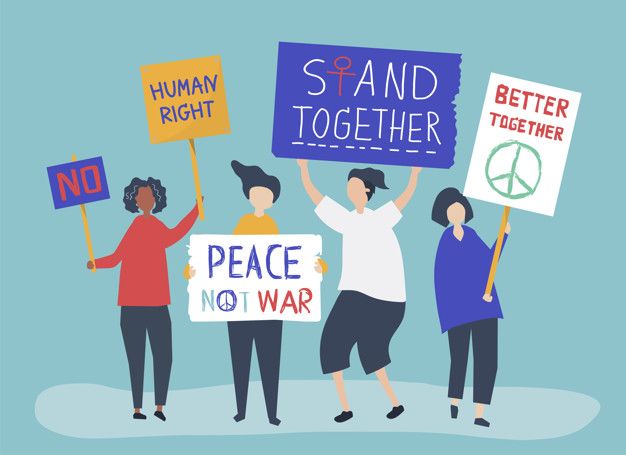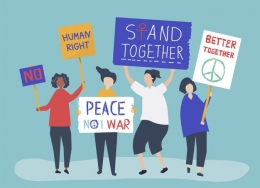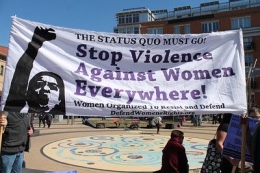In the last decade, violence against women has appeared as a fundamental human rights issue as the statistics are shocking: across the world, it is estimated that between one-third and one-fifth of the world population of women are the victims and survivors of rape, sexual abuse, murder, slavery, genital mutilation, stalking, and physical and emotional torture.
In this short essay I will describe and focus specifically on one of the forms of violence against women, that is domestic violence. Domestic violence has become an overall term used to define violence, which occurs in or around the home (Corrin, 1996).
Some writers use this term to define violence by adults, current or former intimates. Also it could be considered as violence in the household perpetrated by woman's partner, parents, child or other relatives.
Some uses of the term domestic violence include child abuse and elder abuse. However, this essay will be limited to a consideration of violence against women perpetrated only by an adult, current or former intimate, in particular by a woman's partner, and how to deal with this problem by the community and women's organisations/NGOs.
Let us first consider the issue concerning domestic violence. Pickup et al (2001) claim that a large amounts of violence experienced by women happens in the home and is initiated by a husband or an intimate partner. According to a recent report by The John Hopkins University Population Information Program, based on over 50 population surveys, domestic violence is a serious human rights violation on women in all societies. If it is so, what are then the impacts of violence against women?
Firstly, its impact on women's health both physical and psychological. Pisklakova (in Pickup et al, 2001) shows that in terms of physical health, violence against women is dismissed as a normal thing in life with a male partner. However, this violence can be extreme which can lead to death.
In Russia, according to statistics from the Prosecutors' office in 1999, the husbands killed nearly 14,000 women. On the other hand, in terms of psychological impact, Pickup et al (ibid.) explain Heise's theory that violence can lead to feelings of confusion and loss of hope, which are 12 times more likely than other women to attempt suicide, and also explains Counts' theory that a cross cultural study on data from Africa, South America, and several Melanesian Islands, demonstrated marital violence to be a preceding cause of suicide.
Secondly, economics and social effects. Pickup et al (ibid.) show that at community level, women who have survived violence may be rejected and face social stigma. So, they are scared to venture into public spaces and curtail their education. As a consequence, lack of education can limit women's income-generating opportunities.
Thirdly, its influence on their dependants. Pickup et al (ibid.) claim that many babies of women who were beaten during a pregnancy are born injured. Asling-Monemi et al (1999) in Pickup et al (ibid.) state that findings from research conducted in Leon, Nicaragua, the children of women who were facing physical or sexual assault were six times more likely to die before reaching the age of five than other children.
And the other impact, Pickup et al (ibid.) point out that men as perpetrators that criticized by the community may feel alienated, lose love and respect from their families, and also may face arrest and imprisonment as well.

Having explored the impacts of violence against women, let us now focus on how violence against women, in particular domestic violence can be dealt with.
Explanations for violence against women have developed within a vast variety of fields, including sociology, anthropology, criminal justice/law, public health, and social work.
As a result, there are a number of competing theories, which each has different implications for policy aimed at how to eliminate the problem. However, several steps could help. What are the options available to women? Pickup et al (ibid.) explain some steps to be considered.
Firstly, the roles of the family and community structures. Levinson's study of domestic violence has shown that, "Immediate intervention designed to stop the beating or to prevent it from ever starting is a key first line of defence in controlling wife beating". (Levinson in Pryke & Thomas, 1998:98). Jenkins & Davidson (2001) state in relation to natural care giving from the community, "the final factor in prevention is the development of natural caregivers in the community.
All of these professions can enhance their already developed skills in care giving by understanding the victim's and perpetrator's behavior". Also Kelly in Jenkins & Davidson (ibid.) argues that to make women safe in their own communities, "there is the issue of changing communities' norms and values to affect the long-term safety of women".
Secondly, the role of women's organisations. Women may come to women's organisations of their own volition. Women's organisations may offer a number of support services, addressing women's physical and emotional health, their needs for temporary and possibly long-term shelter, access to the legal system, or a means of making a living, so that women can feel empowered to take responsibility for their own lives. And also women's organisations/NGOs are providing legal advice on women's rights, assisting women in the legal processes of sepa ration or divorce. Moreover, many women's organisations or NGOs have developed medical intervention in order to maintain free and easily accessible treatment.
Next, long-term strategies: creating a livelihood, for instance promoting and supporting women's education and training. As we know, education can contribute to women's and girls' confidence and self-worth, and also can make their bargaining position within the family and society stronger.
All mentioned above, we have seen how serious violence against women is. Women as the victims and survivors of rape, sexual abuse, murder, slavery, genital mutilation, stalking, and physical and emotional torture, and even prostitution are very vulnerable. In addition, violence against women has a significant impact not only on the victims and their dependants, but also on the perpetrators.
I shall conclude that violence against women; particularly domestic violence is a very serious problem and should be prevented. It should also be remembered that the problem of violence against women will not be prevented and solved unless the family and the community as well as women's organisations/NGOs and other elements of the country work hand in hand to solve it.*
Reference:
Corrin, Chris (Ed.), 1996. Women in A Violent World Feminist Analyses and Resistance across 'Europe', Edinburgh: Edinburgh University Press.
Jenkins, Pamela J. and Barbara Parmer Davidson, 2001. Stopping Domestic Violence How A Community Can Prevent Spousal Abuse, New York: Kluwer Academic/Plenum Publishers.
Pickup, Francine, Suzanne Williams and Caroline Sweetman, 2001. Ending Violence against Women A Challenge for Development and Humanitarian Work, UK: Oxfam GB.
Pryke, Julie and Martin Thomas, 1998. Domestic Violence and Social Work, England, Ashgate Publishing.
Renzetti, Claire M., Jefrey L. Edleson and Raquel Kennedy Bergen (Eds.), 2001. Sourcebook on Violence against Women, California, USA: Sage Publication, Inc.
Baca konten-konten menarik Kompasiana langsung dari smartphone kamu. Follow channel WhatsApp Kompasiana sekarang di sini: https://whatsapp.com/channel/0029VaYjYaL4Spk7WflFYJ2H








